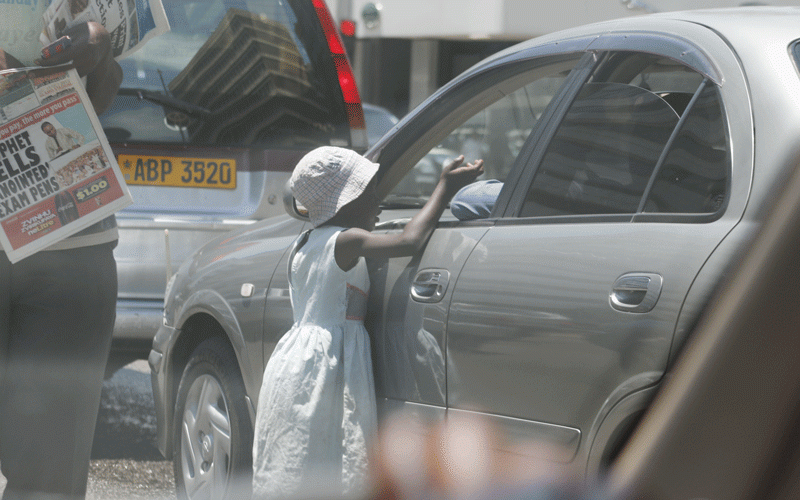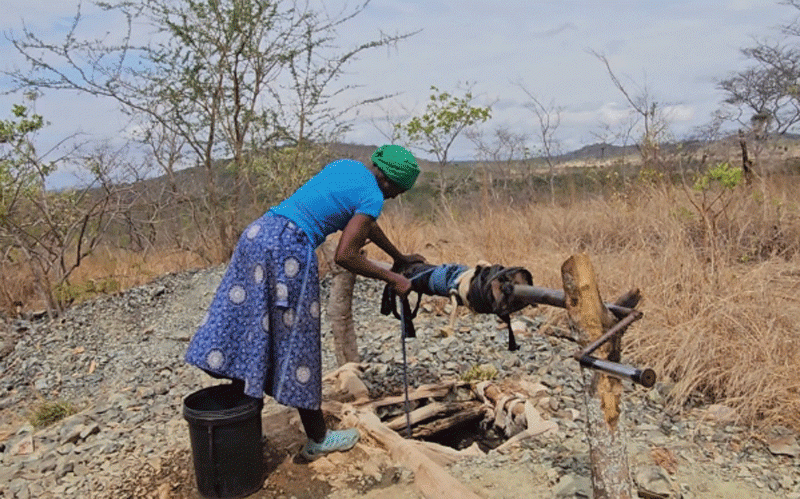
HOMELESS girls living on the streets of Zimbabwe’s major cities are under constant threat, not just from hunger or the harsh realities of life on the streets, but from rampant sexual abuse by older street children and predatory drunkards.
According to investigations by Truth Diggers, the perpetrators, often under the influence of alcohol or drugs, exploit the children’s desperation by offering them food or paltry amounts ranging from 50 cents to US$1 in exchange for sex.
Added to the humiliation and horror, the predators demand unprotected sex and often beat up the hapless children if they refuse to comply.
Contracting sexually transmitted diseases and having unwanted pregnancies are among the greatest fears the children live with.
They do not have money or the courage to seek treatment.
Some end up having children who become street urchins and join their young parents to beg for food on the streets.
They are also open to unspeakable abuse as they grow up in a vicious cycle of poverty and exploitation.
Many of these children, some as young as 12, are subjected to horrific abuse that leaves long-lasting physical and psychological scars.
- Editorial Comment : Our laws protect the cow more than the girl child
- Zim designer shines at African Women Designers Week
- An impassioned plea to Zim parents
- Political will needed to fight child marriages
Keep Reading
The majority of the victims are afraid or too ashamed to report the abuse, fearing further violence or rejection.
The vulnerability of these children has been exacerbated by a lack of systemic support and resources, leaving them exposed to exploitation and trauma.
A survey by Truth Diggers revealed that nearly 40% of street children in major cities like Harare and Bulawayo have been subjected to sexual abuse.
“They are vulnerable to all kinds of abuse, but sexual abuse is particularly damaging to their emotional and psychological well-being,” a social worker, who works with street children said.
“These young individuals, many of whom are homeless or runaways, are increasingly falling prey to abusers who exploit their precarious situation.
“The abuse often goes unreported due to fear of reprisal or lack of trust in authorities.”.
Ruvimbo*, now 16, who has lived on the streets for over a year, told Truth Diggers that she has been a victim of sexual abuse.
“I have never been involved in a fight, not even for food; the only misfortune I experience is being raped,” she said.
“I feel so sick and hungry. I just want to die; I am tired of this life.”
Her experience is not unique.
For many of these girls, sexual violence has become a tragic norm in their daily lives.
Despite efforts to find safety, even under the bright lights of Harare’s city streets, the fear of assault remains constant.
Some have resorted to sex work simply to survive, selling their bodies for meagre amounts of money that barely sustain them.
Michelle Karombo, now 15, who fled her abusive home two years ago, also shared her heart-wrenching story.
“I’ve been on the streets for two years,” she said.
“I ran away from home because my mother was abusive.
“My father died when I was five.
“Here, it’s survival of the fittest. People come asking for sexual services, and in return, they pay us 50 cents or a dollar.”
Others have, however, found solace in each other, whispering promises and weaving plans for a life beyond the streets.
“I am in a relationship. I have a beautiful girlfriend; she went to take a bath under that flyover bridge there,” Marvellous Dondo said.
“If I get food in the streets, I make sure that my girlfriend has eaten first.
“I buy her second hand clothes that cost 50 cents.
“I hope to have a child with her in future. I only live for her.”
Despite Zimbabwe being a signatory to international conventions aimed at protecting children from abuse and sexual exploitation, street children appear not protected by the laws.
The country ratified the UN Convention on the Rights of the Child (CRC) – 1989 on September 11, 1990, making it one of the early adopters of this comprehensive framework for children's rights.
On February 14, 2012 the country ratified the Optional Protocol to the Convention on the Rights of the Child on the Sale of Children, Child Prostitution, and Child Pornography (OPSC) — 2000.
This strengthens Zimbabwe's obligations to combat child prostitution, pornography, and the sale of children.
Zimbabwe ratified International Labour Organisation Convention No 182 on the Worst Forms of Child Labour - 1999 on December 11, 2000.
This requires Zimbabwe to take action against child labour, including sexual exploitation, trafficking, and hazardous work.
However, girls living on the streets are under constant threat of abuse from sexual predators.
Zimbabwe acceded to the UN Convention against Transnational Organized Crime and its Protocol to Prevent, Suppress and Punish Trafficking in Persons, Especially Women and Children – 2000, on October 12, 2013, showing its commitment to combat trafficking, including child trafficking for sexual exploitation.
The country is also a signatory to the African Charter on the Rights and Welfare of the Child – 1990.
Though not a UN convention, Zimbabwe ratified the African Charter on the Rights and Welfare of the Child on January 19, 1995.
Zimbabwe has incorporated these international obligations into domestic laws and policies aimed at protecting children.
The question, however, remains, why are street children seemingly being ignored?
Harare city council spokesperson Stanley Gama said: “The city council does not regulate street kids. Government’s department of social welfare deals with these street kids.”
Public Service, Labour and Social Welfare minister July Moyo outlined a series of programmes aimed at providing care, support, and preventive measures for the street kids.
“The Ministry of Public Service, Labour and Social Welfare has been given the mandate to ensure that all children grow in safe and secure environments,” Moyo told Truth Diggers.
“The ministry has programmes in place which are aimed at ensuring that children are provided with care and support and preventive and responsive mechanisms to streets.”
He said 35 street children were removed from the streets recently.
“To date 35 children who were removed from the streets and placed at the Auxillia Mnangagwa children’s home are attending school at various boarding schools in Masvingo Province.
“Five of those who have been discharged are pursuing vocational training courses at Mushagashe vocational training Centre in Masvingo.”
He said the government is working with organisations such as Angel of Hope Foundation and Auxillia Mnangagwa Children’s Home in Chiredzi for the purpose of rehabilitating children living and working on the streets.
Moyo said the ministry, working closely with local government structures, established provincial task forces in areas like Harare, Mutare, Bulawayo, Masvingo, and Gweru, specifically targeting hotspots for child homelessness.
“These committees, working in conjunction with key government departments, law enforcement (ZRP), and civil society organisations, implement strategies to curb the problem,” he said.
“Other forms of assistance include public assistance, health assistance, travel warrants and sustainable livelihoods programmes.
“When children are identified in the streets they are then assessed, those with relatives are assisted through tracing and reunification and linked to these social protection programmes to ensure that they receive adequate support and they do not resort back to street life.”
Experts warned that unless urgent measures are taken to address the root causes of child homelessness and protect vulnerable populations, the problem of sexual abuse is likely to worsen.
Child rights expert and human rights lawyer, Opal Sibanda, said there was an urgent need for a multifaceted approach to tackle the issue of children living on the streets.
“Addressing the issue of children living in the streets requires a comprehensive approach that involves various stakeholders including the government, NGOs and communities,” Sibanda said.
“To begin with, the root causes of children going to the streets should be addressed.
“There is a need to implement and strengthen social welfare programs to provide financial assistance to families living in poverty.”
Sibanda said there is a need to strengthen and enforce child protection laws, ensuring that those who violate the rights of children living in the streets are prosecuted.
“Police officers should also be capacitated on child protection with regard to children living in the streets, considering that sometimes, such children are always stigmatised and blamed for the abuse they face due to the mere fact that they are living in the streets-thus hindering them from reporting abuse,” she said.
“Children living in the streets who are victims of abuse should also be provided with psychosocial support.”
She further called for the establishment of rehabilitation centres for street children.
“Knowing that the end goal is to remove such children from the streets, the government should establish rehabilitation centres for street children, providing them with shelter, healthcare, education and psychosocial support.
“Government should also facilitate the integration of street children into their families and communities, whenever possible, ensuring a smooth transition with ongoing support.”
Shamwari YeMwanasikana executive director Ekenia Chifamba said vulnerable young girls face severe abuse daily.
“We have heard that female children living in the streets are being abused in various ways,” Chifamba said.
“Motorists also assault these youngsters.
“Some of these street children have babies, and I have managed to have a conversation with them only to realise that these babies were a result of being raped by these men.
“To make the matter worse, these female street children are also failing to access health services and it’s so sad.”
She said the majority of the perpetrators are adult men.
“They feel the girl child who would be on the streets do not have rights and they take advantage of them,” she said..
“Their rights should be acknowledged as well.
“Churches should also accommodate these children with shelter at least so that they feel safe,” she added.










